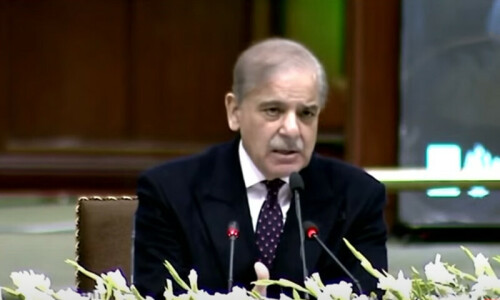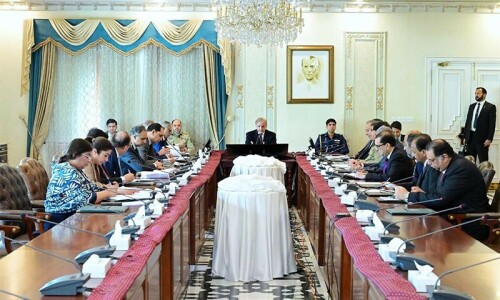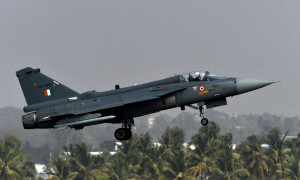Miftah on the defensive after PML-N supremo ‘strongly opposes’ petrol price hike

Finance Minister Miftah Ismail went on the defensive on Tuesday, a day after the government raised the price of petrol for the next fortnight, saying that while he was an "easy target" the revision does not include any new taxes.
In response to a tweet by journalist Hamid Mir, he argued that the government had not imposed new taxes on petroleum products.
"The increase or decrease in prices is according to the purchasing by Pakistan State Oil (PSO)," he said.
Ismail's remarks also come after PML-N Vice President Maryam Nawaz took to Twitter to say that party supremo Nawaz Sharif had strongly opposed the decision to raise the price of petrol.
He even said that he couldn't burden the people further and that he was not in favour of the decision, she said, adding that Nawaz also left the meeting.
When Mir asked the minister why local prices were increasing when global prices had fallen, Ismail provided an explanation for how petrol and diesel prices are decided.
The Oil and Gas Regulatory Authority (Ogra) takes the average Platt prices, adds freight and the premium paid by PSO on top of these prices, and multiplies that by the exchange rate, he said.
"In addition, it also 'trues up' the previous fortnight’s cost by taking into account the rupees paid by PSO at the actual exchange rate, as opposed to the average used to estimate the previous fortnight’s cost.
"We have not added any new tax or levy to the price. The price of petrol has gone up (and diesel has gone down) because the cost paid by PSO in the previous fortnight was more than the cost estimated by Ogra and also because the premium paid by PSO on petrol increased and [the] premium paid on diesel remained unchanged," Ismail said.
"Again, not one paisa of new taxes or levies was added," he said.
However, the journalist continued to grill the minister, to which Ismail replied that the fuel price summary was moved by Ogra and sent to the Finance Division through the Petroleum Division.
"We get it only a few hours before prices are set.
"I am an easy target. Which is fine. But this price change only reflects the change in PSO costs and doesn’t have any new taxes," he said.
The finance minister said that people were welcome to "critique or criticise" him, saying: "I know I am sincere to my country and have saved it from default and [am] working to the best of my ability."
'Not appropriate to comment on meeting'
Addressing a press conference in Islamabad later in the day, Ismail said he was a part of the meeting that deliberated on fuel prices, but added that it would not be "appropriate" for him to comment on anything more beyond that.
The finance minister proceeded to explain the mechanics behind the price increase and referring to a recent interaction with a journalist on fuel prices, explained that he had said nothing about increasing or decreasing prices.
"I [only] said I wouldn't levy more tax."
Ismail said he stood behind the decision and said Prime Minister Shehbaz Sharif should be given credit too for bearing stress as a political leader and approving the price increases.
He added that the government's coalition allies should also be congratulated for "burning their political capital" for the country's sake and expressed the belief that the nation would understand.
Ismail said the economic situation was improving in Pakistan and in a better position than before, adding that further positive effects would be seen as the rupee's appreciation continued and brent prices went down.
The finance minister tackling inflation was next on the government's agenda.
Regarding developments related to the International Monetary Fund (IMF), he hoped that a board meeting would be held with it on August 29 and disbursement of funds would start then.
Questioned about an impending Rs10 increase as petroleum development levy on September 1, as per the IMF agreement, Ismail said it would "100 per cent" happen as long as he was there.
Petrol price raised, HSD, kerosene rates cut
On Monday, the government raised the price of petrol and reduced those of high-speed diesel (HSD) and kerosene for the next fortnight.
According to an announcement by the ministry of finance, the rate of petrol and light diesel oil (LDO) was increased by Rs6.72 and 43 paisa per litre, respectively. On the other hand, the prices of high-speed diesel (HSD) and kerosene were cut by 51 paisa and Rs1.67 per litre respectively.
“In the wake of fluctuations in petroleum prices in the international market and exchange rate variation, the government has decided to revise the existing prices of petroleum products to pass on the impact to consumers”, said the ministry of finance.
As such, the ex-depot price of petrol was raised to Rs233.91 from Rs227.19, showing an increase of Rs6.72 per litre, or 3pc.
The price of light diesel oil inched up by an inconsequential 43 paisa per litre to Rs191.75 per litre from Rs191.32 at present.
On the other hand, the ex-depot price of HSD was set at Rs244.44 per litre, down from Rs244.95 per litre at present, with a notional cut of 51 paisa, or 0.2pc. Likewise, the ex-depot rate of kerosene was cut to Rs199.40 per litre from Rs201.07 per litre, down by Rs1.67 per litre, or 0.8pc.
The government is charging a petroleum development levy of Rs20 per litre on petrol and Rs10 each on HSD, kerosene and light diesel oil (LDO) in line with the commitment with the International Monetary fund.
On August 1, the government had increased the price of HSD and kerosene by Rs9 and Rs5 per litre and reduced those of petrol by Rs3 per litre. Earlier on July 14, Prime Minister Shehbaz Sharif had announced a reduction of Rs18 to 40 per litre in the prices of various products as international prices have gone down.
That was the first time the PMLN-led coalition government reduced petroleum prices after it came to power in the second week of April.
Between May 26 and July 1, the petrol price had risen by 66pc, or Rs99 per litre, while HSD price went up by 92pc since May 26 from Rs144.15 per liter, up by 132.39 per liter. Likewise, the ex-depot price of kerosene had gone up to Rs230.26 per liter, up by 95pc between May 26 and July 1. Similarly, the ex-depot price of LDO went up to Rs226.15 on July 1, up 80pc from Rs125.56 per litre on May 26, up by about Rs100.59 per litre.
Under the deal with the International Monetary Fund (IMF), the government has to gradually increase PDL on oil products to a maximum of Rs50 to collect Rs 855 billion during the current fiscal year.
The petroleum levy had come to an end after the March 1 price revision as international prices were going up and the PTI government had decided to not only reduce petroleum prices by Rs10 per litre but also froze it for next four months i.e. until June 30.
After initial indecision, the PML-N led coalition has been increasing petroleum prices since May 15 under the IMF deal.
At present, the GST is zero on all the key products including petrol, HSD, kerosene and LDO against 17pc normal GST. The government is also charging about Rs20 per litre custom duty on petrol and HSD.
The PTI-led government had given a commitment to IMF for Rs4 per litre increase in PL in December last year on the first day of every month to a maximum of Rs30 per liter, but reversed it on February 28.















































